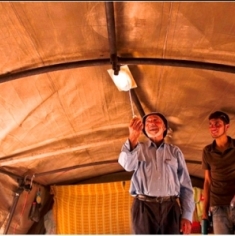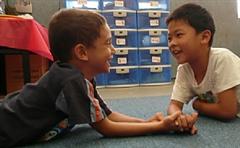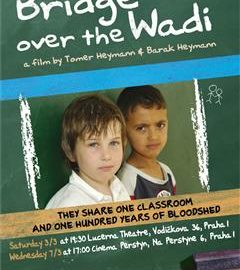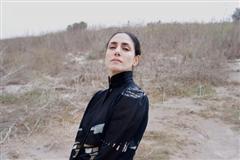The Human Turbine is the story of an exciting encounter between Jewish academics Palestinian shepherds Susiya population – refugees deported three times already. Noam Dotan, child prodigy – a genius physicist and high tech; Uri Pinkerfeld, the Land of Israel and former senior government job; Ehud, Dr. history and Bible; Ariela, taking care of her profession – all adults, supervised illusions, political ideology great hope.
Every one of these individuals chose to give up the pleasures of life, a senior academic status, rank and promotion management positions. by joining forces chose to channel the knowledge, ingenuity and dreams, and harness the wind and the sun for renewable energy project in Susya, a project that aims to supply electricity to the residents who live without electricity in tents and caves. one after another It’s coming on The lights in tents, lighting and other life options bring the greatest light – milking Institute Susiya open to residents of new livelihoods, and economic independence.
Two women’s lives intertwine: one is on her way to see her estranged Jewish Orthodox family; the other is on the run from her Bedouin family who is forcing her into a life without choice. Together, they stand up against their predetermined destinies
Second graders from diverse ethnic and religious backgrounds, in the center of Tel Aviv, contend with a stormy school year, of war and nationalistic currirulum.
An untold side of the Israeli-Palestinian Conflict: gay Palestinians — Louie, Abdu, and Fares — are hiding in Tel Aviv, and until they escape, they must remain “the invisible men.”
For the first time in Israel, a group of Arab and Jewish parents decide to establish a conjoint bi-national, bi-lingual school inside an Arab village. The film follows the school’s first year and portrays through the personal stories of its characters how complicated and fragile it is to create an environment of co-existence against the backdrop of the complicated reality around.
In May 2000, the South Lebanese Army (SLA) collapsed and its members fled in fear of Hezbollah fighters into Israel, their ally who had abandoned them. 700 families of SLA refugees remain in Israel today. Pierre and Massoud are sons of an SLA officer who brought his family to Israel when the two were boys. Pierre aspires to dedicate himself to the Lebanese music he loves, but he is forced to support his family instead. Massoud brings together a group of friends, all sons of former SLA fighters, and starts a basketball team called Erez Naharia (“Cedars of Naharia”). This is the story of children who were born in war-torn southern Lebanon and fled with their parents to Israel a story of youth and dreams in the shadow of war, betrayal and exile.
An Israeli Army officer remembers… A Palestinian remembers as well. This film is a voyage into the collective memory; a voyage rooted in stories of daily life.
Palestinian testimonies collected after the second Intifada revealed a harsh reality that, for Israelis, had always belonged to “them”, to the “others” – the Palestinians. And then, a few years later, the previously taboo accounts of Israeli officers who served during the Intifada began to emerge.
Memories of violence, of suffering, of humiliation. Of course, these stories matched. Israeli and Palestinian want to tell their stories each from their own point of view, as victim or victor, without seeing or acknowledging the reality of the other. But they are a single narrative. While these tales of terrible injustice are performed by Israeli actors, Shlomi Elkabetz’s film connects and unites both sides.
The Hebron Hills garbage dump serves the Israeli settlements in the area and is a source of an eked-out livelihood for 200 Palestinian families from in and around the Palestinian village of Yatta. The stories of eleven-year-old Harun, seventeen-year-old Ibrahim, forty-year-old Yusuf, and sixty-year-old Badawi, expose a daily struggle for subsistence in an inescapable reality of occupation. These are the children of the Occupation, born after 1967, who know no other reality. The violent daily struggle for every scrap of metal in the dump distracts from other everyday pains: a son who sold lands to the Jews, a woman who cannot reunite with her family in Jordan, a father serving a life sentence in Israeli prison, and illiterate parents who push their children to work in the dump while simultaneously holding onto the dream of seeing them break out of the vicious cycle and completing a high-school degree. For the average person in Yatta, who has lost all faith in politics, personal success and education have become a personal weapon against the Occupation, one that might extricate them from the suffocating trap of the garbage dump, both literally and figuratively.
This documentary was filmed over the course of four years and follows Reut, a teenager who spent most of her life moving between institutions and living on the street. The film opens when Reut is seventeen and giving birth to her first son, who is immediately taken away by welfare authorities. Reut’s battle with the State for custody of her son leads her to forge a relationship with his foster family – religious Jews who live in a settlement in the Occupied Territories. Meanwhile, Reut meets and marries a Palestinian man, moves to his village and has two more children. Reut is an introverted and intriguing character who longs for stability and a place to call home. Instead, life hands her surprising twists and turns, right up to its tragic end.




